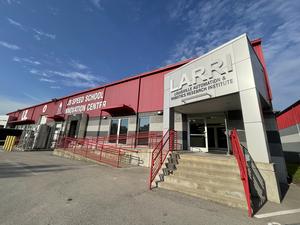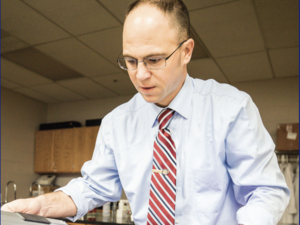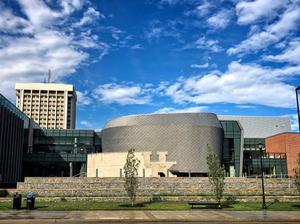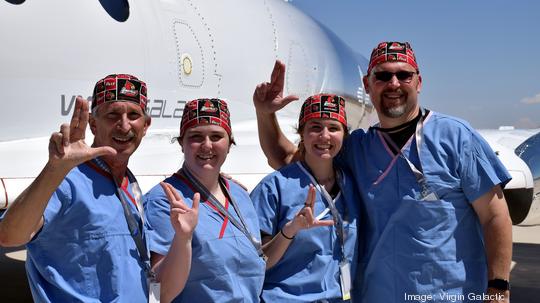
It only takes about six hours to get to the International Space Station and roughly three days to get to the moon.
But to reach Mars, astronauts will have to travel 140 million miles in deep space. For NASA's Perseverance Rover, the journey took about seven months.
That's a reality NASA has been grappling with as it prepares for a manned mission to the Red Planet as soon as the 2030s. Outside of input from Mission Control, astronauts will have to be largely self-sufficient, which includes the ability to perform surgery in case of an emergency.
If you think about the impact zero gravity would have in an operating environment, the feat of containing fluids would be pretty challenging. Fortunately, an invention developed by University of Louisville's astrosurgery team looks to address that very issue, making a trip to Mars that much more of a real possibility.
Dr. George Pantalos, a professor at UofL's Department of Cardiovascular and Thoracic Surgery at the School of Medicine, has been involved in NASA-sponsored flight research for about 30 years, studying how the body reacts to the weightlessness of space flight. A decade ago, he submitted a grant application to do a series of four flight campaigns to work on research in an effort to develop a surgical fluid management system.
Through that research, Pantalos was searching for a specific kind of sensor to detect and stop fluid flow. A graduate student noted that "Dr. T," Dr. Tommy Roussel, an assistant professor in the Department of Bioengineering at the J.B. Speed School of Engineering, might have an idea for something that would work.
The surgical fluid management system, which consisted of a dome-like structure that would fill up with water and simulated blood during the flight, was housed in a custom-designed "glovebox" that resembles an infant incubator. A total of 23 UofL students have worked on its development over the course of 10 years.
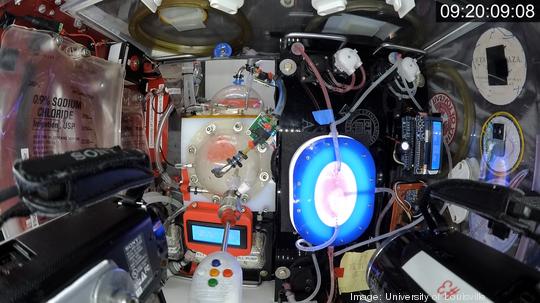
After testing the system on parabolic jet flights that simulate weightlessness, the pair of UofL researchers and their team of students were ready to test the system to see how it would perform in a sub-orbital flight, meaning true zero gravity. They were approved for a grant by the NASA Flight Opportunities Program in early 2016 and began to automate the entire process, as the flight wouldn't allow extra passengers on board to operate it.
"Obviously this isn't something you get into if you're looking for immediate gratification," Pantalos said. "But all the work we did preparing for the zero-gravity flights really helped us get a better understanding of what we needed to do and how we were going to get it done."
The astrosurgery team was initially preparing to fly with Virgin Galactic in 2017, but were plagued with delays for years as the company didn't have its first test flight of its SpaceShipTwo until late 2018. They eventually began pre-flight preparations in 2019 before the global coronavirus pandemic hit last year.
Isolation during the pandemic afforded Roussel the opportunity to focus on fine-tuning the system's automated processes in a home lab. He spent four or five months leading up to the anticipated November 2020 flight working on the little details to make sure everything would work appropriately.
Because unlike most experiments, they only had one shot to get it right — a single opportunity that they had waited years for.
"Just knowing that this thing is automated is really nerve-wracking because you're not there with it," Roussel said. "We had no telemetry, no data coming back down and no way to watch it. All we knew was that they were giving it power from the spacecraft."
That November flight was scrubbed, as well as a rescheduled one in February 2021. But weeks before Sir Richard Branson's flight to space, UofL researches were finally able to test their invention in May.
It was a success. The system worked as expected in zero gravity.
The test sequence included turning pumps on and off to increase or decrease pressure inside the containment dome to control bleeding, injecting simulated blood into the dome, testing the multifunction device’s suction, irrigation and light capabilities and finally, emptying the containment dome.
There were a couple of discrepancies, however, likely due to the impact of no gravity and the unanticipated hotter temperatures of the cabin, Pantalos said. But overall, they are pleased with the results.
"This thing is completely different than it would have been if we had flown in 2017," Roussel said. "The delays allowed us to rethink and better engineer things, so I think our success is really because of those delays as frustrating as they were at the time."
As more and more people are able to access sub-orbital space — thanks in part to the space race between billionaires Branson, Jeff Bezos and Elon Musk — Pantalos said they are looking to apply for a grant from NASA that would allow an investigator acting as a surgeon to use the system on a sub-orbital flight as to test how it would be used on a real mission.
"From the feedback we're getting from NASA staff who run the Flight Opportunities program, they really like what we're doing and they're very pleased," he said.
